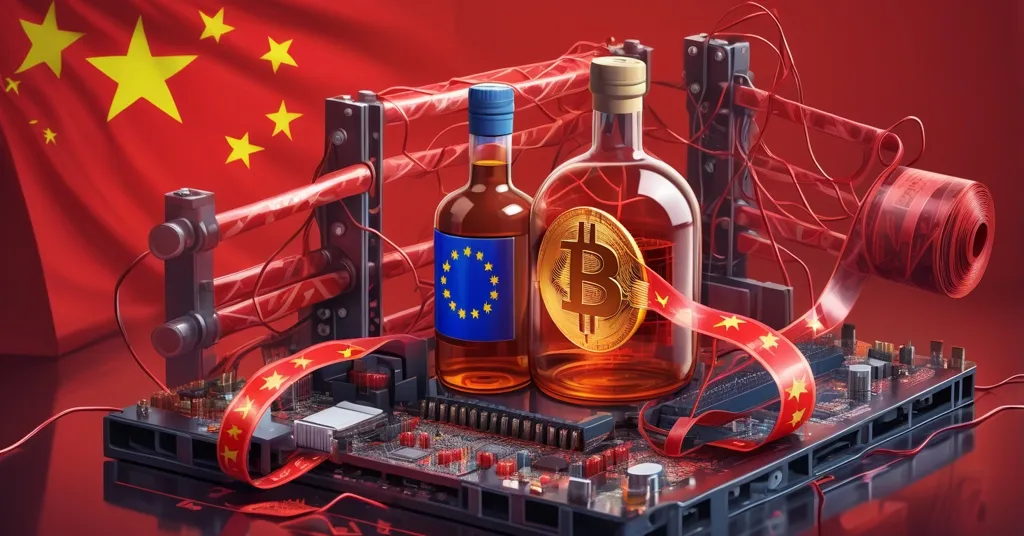China-EU Cognac Tariffs Threaten Bitcoin Mining via Supply Chain Risks

Trade Wars Hit Close to Home: How China-EU Cognac Tariffs Could Ripple Into Bitcoin Mining
Geopolitical spats over luxury spirits might seem like a world away from Bitcoin and blockchain, but a recent tariff war between China and the EU over French cognac serves as a stark warning: global trade tensions can disrupt even the most niche industries, and the crypto space isn’t immune. With China slapping hefty duties on EU brandy in retaliation for tariffs on electric vehicles, the ripple effects could reach the Bitcoin mining sector, where reliance on Chinese-made hardware remains a glaring vulnerability.
- China’s Tariff Move: Up to 34.9% duties on EU brandy, mainly French cognac, starting July 5, 2025, as a counter to EU tariffs on Chinese electric vehicles.
- Big Players Dodge the Hit: Major cognac brands like Hennessy and Rémy Martin can avoid tariffs via minimum pricing deals.
- Crypto Risk: Trade wars could spill over to Bitcoin mining hardware, with China dominating the production of critical ASIC machines.
Let’s unpack this trade dispute with a sharp focus on why it matters to Bitcoin miners and blockchain enthusiasts. China’s decision to impose tariffs of up to 34.9% on EU brandy, hitting the heart of France’s $3 billion cognac industry, comes after a year-long anti-dumping investigation that began in January 2024. Effective from July 5, 2025, and set to last five years, these duties are a direct response to the EU’s steep tariffs on Chinese electric vehicles—a policy France aggressively supported, as detailed in recent updates on China-EU brandy tariffs. While industry giants like LVMH-owned Hennessy, Martell, Courvoisier, and Rémy Cointreau can sidestep the tariffs by agreeing to undisclosed minimum pricing thresholds, smaller distilleries in France’s Charente region are getting hammered. Since October 2024, temporary tariffs and mandatory upfront payments, known as security deposits, have bled their cash reserves dry. The fallout? Cognac exports to China have cratered by 70%, as reported by the Bureau National Interprofessionnel du Cognac (BNIC), a devastating blow to a key market.
The numbers paint a messy picture for the spirits industry. After the tariff announcement, Rémy Cointreau’s stock nudged up by 0.54%, likely reflecting relief over the pricing workaround. Meanwhile, Pernod Ricard dipped 0.3%, and LVMH took a 1.5% hit. But beyond stock tickers, the real pain is felt by smaller producers who can’t negotiate their way out of this mess. The BNIC has called the pricing deal “less unfavorable” than full-blown tariffs but still a far cry from the open market access of yesteryear, pushing hard for a political fix, as explored in discussions on cognac producers favoring price deals. On the diplomatic front, China’s Foreign Minister Wang Yi is touring Europe—hitting Berlin, Brussels, and Paris—ahead of an EU-China summit kicking off on July 24, 2025, aiming to cool tensions over this and other trade flashpoints like rare-earth export limits.
“A substantially less punitive alternative,” Rémy Cointreau stated, pointing to the pricing deal as a way to keep investing in China despite the trade friction.
Pernod Ricard offered a reluctant nod, admitting the new duties “cost far less than if the provisional tariffs stuck around for good.”
The EU, however, isn’t playing nice, with a spokesperson blasting the tariffs as “unfair and unjustified.”
From Cognac to Crypto: Why Bitcoin Miners Should Pay Attention
Now, let’s cut through the noise and connect the dots to Bitcoin. You might wonder why a spat over fancy booze matters to a decentralized, borderless tech like cryptocurrency. The answer lies in the fragile web of global supply chains—and China’s iron grip on the hardware that keeps the Bitcoin network humming. China is the epicenter of manufacturing for Application-Specific Integrated Circuits, or ASICs—specialized machines built solely for mining Bitcoin, as outlined in resources like this Bitcoin mining hardware wiki. Unlike regular computers or gaming GPUs that can mine altcoins like pre-merge Ethereum, ASICs are hyper-efficient but pricey, custom-built beasts. Companies like Bitmain, a Chinese giant controlling roughly 70% of the global ASIC market, are the lifeblood of mining operations worldwide. When trade wars flare up, as they have over electric vehicles and now cognac, the risk of tariffs or export curbs spilling into tech sectors isn’t just theoretical—it’s a looming disaster.
Bitcoin mining is a cutthroat game of margins. Miners rely on cheap, reliable hardware to solve complex mathematical puzzles, secure the blockchain, and earn BTC rewards. A single high-end ASIC can cost thousands of dollars, and even a modest 25% tariff on Chinese tech exports could jack up prices by $500-1,000 per unit. For large-scale mining farms with deep pockets, that’s a headache. For small-time miners—think solo operators or small collectives—it’s a death knell, crushing profitability faster than a bear market dump. Community discussions, such as those on China-EU trade wars impacting Bitcoin mining, highlight growing concerns. And let’s not forget delays: trade barriers could slow shipments, forcing downtime as rigs sit idle waiting for replacement parts or new gear. The Bitcoin network’s hash rate, a measure of its computational power and security, could take a hit if enough miners are priced out or stalled.
Historical precedent backs up the concern. During the 2018-2019 U.S.-China trade war, tariffs on Chinese electronics led to price spikes for tech components across the board. While Bitcoin mining wasn’t directly targeted, ancillary costs—like power supplies and cooling systems—crept up, squeezing miner margins. Fast forward to 2021, when China banned domestic mining outright, and we saw a scramble for hardware as operations relocated globally. Supply crunches pushed ASIC prices through the roof, with waitlists stretching months. If today’s EU-China spat escalates to tech exports, we could see a repeat—only this time, smaller miners might not survive the storm, a risk echoed in broader analyses of trade wars affecting the cryptocurrency mining industry.
Risks to ASIC Supply Chains: A Centralized Chokepoint
Here’s the ugly truth: while Bitcoin itself is decentralized, the infrastructure propping it up often isn’t. China doesn’t just dominate ASIC production; it controls the lion’s share of rare-earth minerals—critical elements like neodymium and dysprosium used in everything from smartphone chips to mining rig circuits. If trade disputes lead to export restrictions on these materials, as China has hinted at in response to EU policies, the entire tech supply chain could grind to a halt. For Bitcoin miners, that’s not just a cost issue; it’s an existential threat to scaling operations or replacing worn-out gear, a challenge compounded by ongoing China trade disputes over ASIC hardware production.
Smaller players are especially vulnerable, much like those cognac distilleries in Charente struggling under temporary tariffs. A big mining farm backed by venture capital can stockpile ASICs or absorb price hikes. A garage miner with a handful of rigs? They’re toast if costs spike or shipments stall. This isn’t speculation—post-2021 ban data showed small miners dropping off the network as hardware became scarce, centralizing hash power in the hands of a few giants. Trade wars could turbocharge that trend, undermining Bitcoin’s core promise of accessible, democratic participation, a concern raised in forums like how tariffs could affect Bitcoin mining hardware costs.
Decentralization: Silver Lining or Just Wishful Thinking?
Let’s play devil’s advocate and look for a glimmer of hope. Could trade disruptions be a blessing in disguise for Bitcoin’s ethos of decentralization? If tariffs make Chinese ASICs unaffordable, it might force the industry to diversify manufacturing—think new hubs in North America, Taiwan, or even Europe. Some Bitcoin maximalists would cheer this as a step toward cutting reliance on any single point of failure, be it a government or a manufacturing monopoly. Hell, imagine community-driven, open-source hardware projects springing up to sidestep tariff traps altogether. That’s the kind of disruption we live for—effective accelerationism in action, pushing tech forward at warp speed.
But let’s not drink the Kool-Aid just yet. Diversifying hardware production sounds great on paper, but it’s a pipe dream in the short term. China’s entrenched dominance in rare-earth mining and tech fabrication isn’t something you replicate overnight. Even if a U.S. or EU-based ASIC maker like Intel or TSMC pivots to mining gear, costs would likely be higher, and scale would lag for years. Meanwhile, miners get screwed waiting for this utopian shift. The pain is real, and no amount of “decentralization now” rhetoric changes the fact that most operations depend on Bitmain’s next shipment to stay afloat.
Beyond Mining: Blockchain as a Trade War Shield?
Stepping back, this cognac tariff mess is a wake-up call for the broader crypto community. Trade wars don’t just threaten Bitcoin mining hardware; they could jack up energy costs, internet infrastructure, or components for altcoin staking setups and Web3 IoT devices. Yet, blockchain tech might offer a counterpunch. Projects like VeChain are already using decentralized ledgers to track supply chains transparently—think tracing ASIC components from factory to miner without middlemen getting tariffed into oblivion. Could tokenized trade systems bypass traditional economic barriers altogether? It’s a long shot, but as champions of freedom and privacy, we see potential in flipping the script on old-world trade bullshit.
Still, we’re not blind to the grind ahead. With threats like former President Donald Trump’s potential tariffs on EU imports adding pressure on European firms’ U.S. sales, the message is clear: no industry is safe from policy whims. If U.S.-China tensions reignite, crypto-adjacent sectors could easily get caught in the crossfire. The cognac saga isn’t just a quirky news blip; it’s a preview of how fast trade disputes can gut markets, as seen in coverage of the EU-China trade dispute over electric vehicle tariffs—and a reminder that even in a decentralized future, real-world politics can still throw a wrench in the gears.
Some companies, however, have managed to navigate this mess, with Hennessy and Rémy Martin securing exemptions through minimum pricing agreements in 2024, offering a temporary reprieve from China’s tariffs. But for many others, the uncertainty looms large.
Key Takeaways and Questions for Crypto Enthusiasts
- What do China-EU cognac tariffs have to do with Bitcoin?
They expose how trade wars can disrupt global supply chains, potentially hitting Bitcoin mining hardware since China dominates ASIC production, critical for miners. - How could tariffs impact Bitcoin mining costs?
A tariff on Chinese tech exports could raise ASIC prices by hundreds or thousands of dollars per unit, slashing profitability, especially for smaller miners, and risking network hash rate drops. - What are ASICs, and why are they vital for Bitcoin miners?
ASICs are specialized machines designed exclusively for mining Bitcoin, offering unmatched efficiency. Mostly made in China, any supply disruption directly threatens miners’ operations. - Is there an upside to trade wars for decentralization?
Possibly—disruptions might spur new manufacturing hubs outside China, reducing centralized reliance, though the short-term pain for miners could be brutal. - How can the crypto community brace for supply chain risks?
Push for diversified hardware production, back open-source rig designs, and explore blockchain tools like supply chain tracking to dodge trade war fallout.
So, while we’re not raising a glass of overpriced cognac to toast these tariffs, we’re damn sure keeping tabs on how trade wars could rattle Bitcoin’s foundation. The takeaway is blunt: even a decentralized juggernaut like Bitcoin isn’t insulated from global power plays. As tensions simmer, the crypto crowd needs to double down on innovation—building hardware independence and supply chain resilience—because waiting for the next tariff bomb to drop isn’t a strategy. Let’s hash on, but with eyes wide open.



